Former UNO hockey star Jake Guentzel left school in 2016, after junior year, to pursue his dream of playing professionally. No one expected what happened next.
The boyish newcomer with the impish smile went from nondescript rookie wing prospect to elite scorer during two seasons with the Wilkes-Barre/Scranton Penguins in the American Hockey League. Upon joining the parent Pittsburgh Penguins in November, he made an immediate splash. In his NHL debut, he scored a goal with his first shift. He followed with a goal on his third shift. Two shots—two goals.
By January, Guentzel secured a permanent seat in the NHL team’s locker room. The club showed faith, placing him on its top-scoring line alongside captain Sidney Crosby. The Crosby-Guentzel pairing proved pivotal in Pittsburgh’s second straight Stanley Cup win. Their team defeated Nashville four games to two in the finals.
Guentzel would make NHL playoffs history before hoisting the Stanley Cup overhead: His 13 postseason goals made him the first rookie to lead the NHL playoffs (five of those goals were game-winners); his 21 points tied the league rookie record for a postseason; and he became the second-ever rookie to score a hat trick in the playoffs.
UNO has produced several NHL players but Omaha hockey historian Gary Anderson says, “I don’t remember any who have had the same impact.”
Indeed, the Maverick who signed with Pittsburgh as a third-round, 2013 draft pick (77th overall) became the talk of the hockey world. He paired with future Hall of Famer Crosby to form a lethal scoring tandem on the NHL’s best team. He was in the running for playoffs MVP (Conn Smythe award) won by his superstar teammate.
His former coach at UNO, the recently retired Dean Blais, marvels at Guentzel’s exploits.
“It’s hard to explain,” Blais says. “I don’t think anyone would have forecast that. He played well in the American League, but he was up and down, and when that happens you don’t expect great things.”
Not from someone who would have been playing his senior year at UNO.
“Then he goes into Pittsburgh, has a pretty good season, and in the playoffs he’s a couple goals or points away from maybe winning the Conn Smythe. For Jake to step in and do that is pretty special,” Blais says.
Sharing it all was former UNO and current Penguins teammate Josh Archibald. They became the first Mavs to have their names engraved on the Stanley Cup.
Guentzel’s performance recalled what local icon Bob Gibson did as a St. Louis Cardinals pitcher in World Series competition half a century ago. Like Gibson, Guentzel is now an Omaha sports legend. The city has a legitimate claim on him, too. He was born in Omaha when his father coached the Omaha Lancers. His two older brothers, Ryan and Gabe, also played collegiately.
He’s the second Omaha native to reach the NHL (Jed Ortmeyer in 2003 was the first).
The local connection extends to Guentzel’s father assisting one season at UNO under Blais (in 2010-2011), while the younger Guentzel also helped lead UNO to its only Frozen Four in 2015.
Mere weeks removed from gaining hockey immortality with his improbable heroics, he unwinds from the spotlight with family in his other hometown of Woodbury, Minnesota.
“It’s hard to put into words what happened,” he says. “It was hard to soak it all in at some points. With each win, the media got more and more crazy. It was definitely a crazy journey.”
r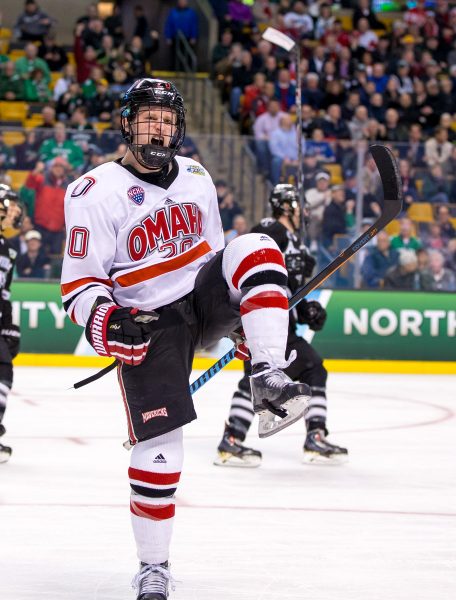 r
r
Preparation meets success
Guentzel’s skill and mindset proved well-suited for hockey’s biggest stage.
Mike Kemp, UNO associate athletic director and former Mavericks coach, praises his “high hockey IQ.”
“What makes him a special player at the highest level is his ability to think his way around the ice,” Blais says. “His biggest asset is his playmaking ability and his ability to get to the net.”
Former UNO teammate Justin Parizek says Guentzel has long-mastered the mental aspects of the game: “He thinks the game really well. He’s always a couple steps ahead of the play.”
UNO hockey broadcaster Terry Leahy admires Guentzel’s pedigree: “He just knows the game, and that comes right from his father and his brothers. He was just built from the ground up. His dad had a huge influence on that. His two brothers were really good college hockey players.”
Parizek envies the extra push Guentzel got at home: “His whole childhood he was pushed trying to keep up with his older brothers. Keeping up with bigger, stronger guys gave him that competitive edge. His dad’s a really good coach, and having that 24-7 extra coach in his ear has given him insights into how he can do things better.”
Archibald says it’s no wonder Guentzel was ready to shine: “He’s been preparing his entire life for that moment. Everybody along the way has put their piece in with him, and he’s taken it all in.”
“He was definitely groomed well,” says another former UNO linemate, Austin Ortega.
Even Guentzel’s father, University of Minnesota associate head coach Mike Guentzel, says the moment is “never too big” for his son.
The rising star credits his family for giving him what he needed to excel. “They instilled ‘you gotta work every day.’ It definitely implanted in my brain,” Guentzel says.
He’s grateful they shared in his shining moments—from that memorable first NHL game to hoisting the Stanley Cup.
“It’s definitely a family thing. I realize all the sacrifice they put in for me over the years in everything they did. They’re always there for me,” he says.
Guentzel’s dad and siblings never got this far in hockey, but they’ve been with him each step of the journey.
“Whenever I need something, I can look up to them and realize they’ve been through similar situations over their hockey careers,” he says. “They’ve definitely been huge for me, and it’s definitely cool to share this with my family.”
When dreams come true
Growing up, Guentzel dreamed of winning the Stanley Cup, just like thousands of other kids.
“But to have it come true my first year in the NHL is definitely crazy. I mean, I never would have expected that. It’s pretty special,” he says.
Securing the championship against Nashville, he says, was “a night I’ll remember for the rest of my life.”
Archibald says the occasion of two Omaha hockey products being part of a title team didn’t escape them.
“For both of us to play together at UNO and then to take that next step together in Pittsburgh was a great experience,” Archibald says, adding that as the Stanley Cup got passed around, “there was a moment on the ice when we were standing next to each other, and Jake looked at me and said, ‘I can’t believe we’re here. To do this together is the best thing in the world.’”
r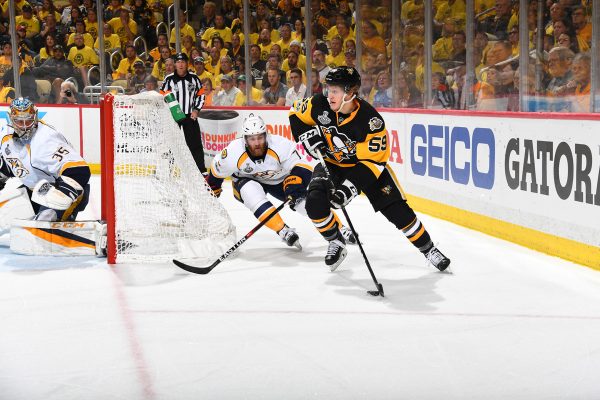 r
r
Mind over matter
As the playoffs wore on, more hype came Guentzel’s way. Except for texts referencing his newfound celebrity, he says, “I tried to stay away from that stuff. You don’t want to get caught up in what people are saying. I just try to focus on what’s at hand.” As for media, he “gives them what they want” and moves on.
The well-grounded athlete applies a pragmatic approach to the game.
“Each level you go up, the competition gets harder,” Guentzel says. “You have to do whatever it takes to get there—if it’s staying late after practice, doing extra work. That’s what I’ve always tried to do. Growing up, you go through bantams, high school, juniors, and college. I’ve just stayed with it. I’ve tried not to think ahead of what’s happening in the moment. It’s the way you have to think. If you don’t think that way, you don’t really want to play, and you don’t really love the game.”
Others attest to his dedication.
“Everything he’s accomplished is due to the hard work he put in himself,” Ortega says, “and he got rewarded.”
Archibald knows well the sacrifice: “It doesn’t come easy. You have a lot of pressure on your back. But he pushed through everything. I think one of the things that helps him is being one of the hardest workers in the room.”
Guentzel feels his approach is consistent. “It hasn’t changed much,” he says. “People are going to be coming after you, so you’ve got to make sure you’re ready every day for everyone’s best.”
What some term “pressure to perform in the clutch,” he considers “a chance to do something special. I think as a player you like those moments. They’re fun to be a part of,” he says.
Of his Penguins debut, Guentzel says, “There were nerves for sure, but you just gotta stick with what got you there. There was a lot of emotion running through me that night. I was just trying to make the most of the opportunity, and remembering that all the hard work I’ve put in has finally led to my dream coming true.”
He felt at home in his new digs. His space in the Pittsburgh locker room was just beside Crosby, who took the rookie under his wing.
“It’s cool that they all kind of take you in and make you feel comfortable right away,” Guentzel says of his veteran teammates. “I think that’s why they have so much success.”
His own even-keeled attitude helped with the season grind, too.
“You want to be a good player in the league, so you’ve got to do the little things and keep working on them every day,” Guentzel says. “You’ve just got to stay with it, stay positive, because you’re going to go through tough patches.”
Coming up big
In the playoffs, he kept making big assists and goals.
“I watched all the games at home with my family,” Parizek says, “and sometimes we were like, ‘Are you kidding me, he did it again?’ It was a surreal run for him, and I couldn’t be more happy and proud.”
Guentzel’s scoring binge was out of character for someone reluctant to shoot in college.
“When I was at UNO, coach got upset with me that I was passing too much,” he says. “I was kind of a playmaker, and I always looked for the next play. As my career went on, I started to shoot more. I think I finally realized if I shoot more maybe I can score some more goals.”
“He’s a pass-first guy,” Blais confirms. “For three years we tried to get him to be a little bit more selfish, and when the opportunity’s there, shoot it.”
Making that transition in the NHL is unusual.
“That’s a credit to Sidney Crosby,” Guentzel says. “You’re just trying to find areas on the ice where he can get you the puck because he can pretty much get it to you wherever you’re at. I was very fortunate.”
Blais agrees Guentzel found the right mentor.
“I think when it really clicked is when he started playing with Sidney Crosby,” Blais says. “It’s one thing playing for Pittsburgh, but it’s another thing for Sidney Crosby to want this 22-year old kid to play with him. That’s pretty special when the best player in the world wants Jake Guentzel as his linemate because he knows Jake plays the same way.
rAnd I’m sure Sidney Crosby said, ‘Hey, Jake, when I get a pass from you, I’m going to shoot, and when you get it from me, you shoot.’ I mean, that’s the way it works. I think when Jake learned how to move and shoot the puck at the highest level is when he took off. Credit to Jake and his coaching staff but probably the most influential was Sidney Crosby.”
r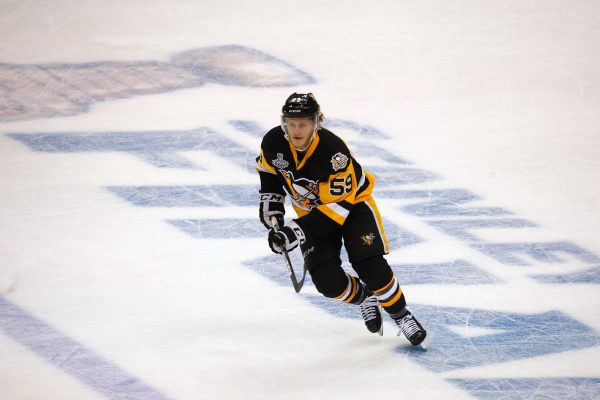 r
r
Finding a coach and expanding his game
Despite not being the scorer his coach wanted, Guentzel treasured playing for Blais: “He was huge for me. I can’t thank him enough for all he did for me. He rounded out my game. He made me realize that to play every day you have to be at your top. That’s a big thing he impacted me with. I wouldn’t be the player I am today if I didn’t play in Omaha for him.”
Leaving after his junior year did not come lightly. “It was tough leaving Omaha for sure,” he says. “I just thought I was ready for the next challenge. It all worked out.”
Blais says being the close hockey family the Guentzels are, they made the decision jointly and he fully supported it. “Jake’s always been that player that has reached the highest level. He did it in college and now he’s doing it in the NHL. He’s one of the top players I’ve coached in all my years of coaching.”
UNO broadcaster Terry Leahy recalls Guentzel “began his college career the way he began his NHL career. “He had an assist right off the bat his first game as a Maverick—and he was on his way. The biggest memory I have of him is that his anticipation and passing skills were unbelievable.”
“He started out like gangbusters,” Blais remembers. “He broke Greg Zanon’s assist record his first year. Even though other teams were keying on him with their best players, Jake still managed to get his points. Even in the NHL, playing against the other team’s top line, Jake still managed to make plays and to get his goals.”
“He’s a complete package mentally and physically,” Leahy says. “He can fly, shoot, pass. I wouldn’t be surprised to see him wearing a [captain’s] letter for the Penguins in the not-too-distant future. He’s very mature…and he’s a pot-stirrer. He can chirp [trash talk] with the best. He was a little restrained his first year in the NHL, but there were moments in the finals you could see him starting to get under some Nashville skins. That’s definitely a part of his game. He’s got that baby face, but he can spring those horns pretty quickly after a whistle.”
r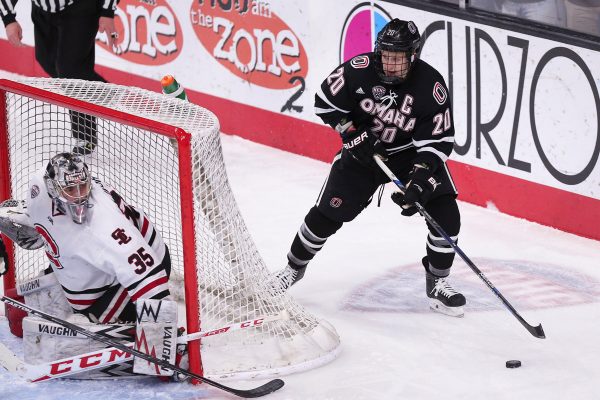 r
r
His UNO hockey family
Guentzel is happy his playing, not talking, is raising UNO’s national profile. “I only think it’s going to make the school become even more of a hockey place and have people realize Omaha’s on the rise,” he says.
“It’s a huge step for UNO hockey,” Archibald agrees. “It kind of puts it on the map in an unprecedented way.”
Leahy says with Guentzel and Archibald in the finals “UNO was on display through the whole run.” The fact that they are Stanley Cup winners “will be huge for recruiting.” UNO’s Mike Kemp and new hockey head coach Mike Gabinet have echoed such sentiments.
Austin Ortega takes inspiration from Guentzel’s example. “Seeing him do so well has definitely given me a little extra motivation and expectation to reach that goal and do what he’s done,” Ortega says.
Guentzel has not forgotten his UNO hockey family. “I keep in touch with them almost every day. They’re close friends. They’re definitely special to me,” he says.
“He has a lot of support back in Omaha and wherever his old teammates are,” Ortega says. “Myself and two other guys saw him for games three and four in Nashville. He was just the same old kid that we knew.”
“He’s not going to change, he’s not going to be cocky or arrogant about it,” Justin Parizek says. “He’s still going to go about his business and be the great guy he is and treat everyone the same.”
r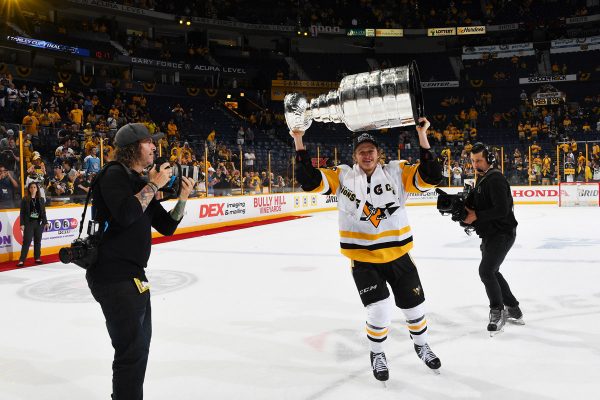 r
r
Making his mark
Dean Blais can still hardly believe what transpired.
“To get his name on the Stanley Cup, to get a championship ring, to go from making $80,000 to $800,000, plus the Cup bonus. Not bad for a kid right out of college,” Blais says. “Everything looks bright for his future.”
Guentzel doesn’t think he’s arrived yet.
“I’ve still got to establish my spot,” he says, speaking with Omaha Magazine in June. “I’m still a young guy. I’ve got to go and try to make the team out of camp. You never know what’s going to happen, so you’ve just gotta try and make a name for yourself and do what it takes to stay at that level. You can’t take it for granted because there’s someone right behind who’s going to try to take your spot.”
Archibald senses Guentzel is hungry to “go back out there and prove to everybody he can do it again—I have all the faith in the world he’s going to be able to do it.”
“You gotta enjoy it, because it’s a once in a lifetime opportunity,” Guentzel says.
Visit nhl.com/penguins for more information.
rThis article was printed in the September/October 2017 edition of Omaha Magazine.














